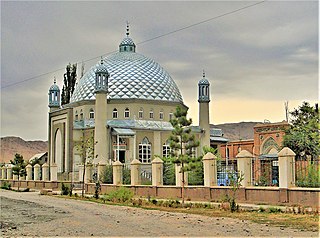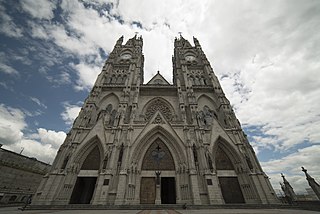Related Research Articles
Religion in Trinidad and Tobago, which is a multi-religious country, is classifiable as follows:

Jordan contains one of the oldest Christian communities in the world, their presence dating back to the crucifixion of Jesus Christ early in the 1st century AD. Christians today make up about 3% of the population. Jordanian Christians in a country of almost 10 million are thought to number 250,000-400,000, down from 20% in 1930, but their absolute numbers have increased. This is due to high immigration rate of Muslims into Jordan, higher emigration rates of Christians and higher birth rates for Muslims. All Christian religious ceremonies are allowed to be publicly celebrated in Jordan.

Christianity has dominated Guatemalan society since its Spanish colonial rule, but the nature of Christian practice in the country has changed in recent decades.

Christianity is the largest religion in Uruguay, with Catholics having the most adherents, but around 44.5% of the population is non-religious as of 2021. Church and state are officially separated since 1916.

Religion in Angola is diverse, with Christianity being the most widely professed faith. Roman Catholics constitute 41% of the population. Other Christian denominations include Baptists, Methodists, Congregationalists, Lutherans, Reformed Churches and Seventh-day Adventists and Jehovah's Witnesses - all these denominations making up about 43% of the population.

Christianity is the predominant religion in the Democratic Republic of the Congo, with Catholicism and Protestantism being its main denominations.
The Constitution provides for freedom of religion, but the government imposes onerous criteria on religious groups for official recognition, which is required for the legal construction of houses of worship. There is no registered muslim groups in Angola.

Islam is the main religion in Kyrgyzstan and the constitution guarantees freedom of religion.
In Qatar, the Constitution, as well as certain laws, provide for freedom of association, public assembly, and worship in accordance with the requirements of public order and morality. Notwithstanding this, the law prohibits proselytizing by non-Muslims and places some restrictions on public worship. Islam is the state religion.
The issue of Freedom of religion in Russia is complex with a long and fraught history. As of 2023, Russia is a majority Russian Orthodox society, with significant minority religions within its borders protected by the Constitution of Russia. However, the international community often disputes whether this protection is carried out in practice.
The Constitution provides for freedom of religion.

When it comes to religion, the Ecuadorian society is relatively homogeneous, with Christianity being the primary religion. Roman Catholicism is the main Christian denomination in the country. There are also minorities of other religions.

Religion in Guyana is diverse, with Christianity being the most widely professed faith.

Christianity is the predominant religion in Solomon Islands, with Anglicanism being the single largest denomination.
Christianity is the dominant religioninPalau, practiced by around 89.7% of the total population as of 2015. Freedom of religion is enshrined in Palau's constitution, and both the government and general society respect this right in practice.

Christianity is the largest religion in Venezuela, with Catholicism having the most adherents.
Freedom of religion in Paraguay is provided for in the Constitution of Paraguay.
The Constitution of Panama provides for freedom of religion.
The status of religious freedom in Europe varies from country to country. States can differ based on whether or not they guarantee equal treatment under law for followers of different religions, whether they establish a state religion, the extent to which religious organizations operating within the country are policed, and the extent to which religious law is used as a basis for the country's legal code.
Freedom of religion in Serbia refers to the extent to which people in Serbia are freely able to practice their religious beliefs, taking into account both government policies and societal attitudes toward religious groups.
References
- 1 2 3 4 5 6 US State Dept 2022 report
- 1 2 3 International Religious Freedom Report 2007: Ecuador. U.S. Bureau of Democracy, Human Rights, and Labor (2007).
 This article incorporates text from this source, which is in the public domain .
This article incorporates text from this source, which is in the public domain . - ↑ Freedom House website, retrieved 2023-08-08
